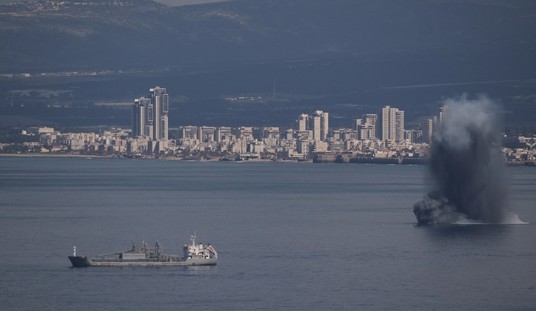You only go to war for two reasons. Either you know you're going to win, or you know that you're going to lose if you don't.
Even though we're only two weeks removed from the insanely brutal Hamas invasion of southern Israel that killed over 1,400 Israeli citizens and foreign nationals, and the ground war to eradicate Hamas in Gaza has yet to start, it is very clear that Hamas has won a stunning strategic victory and reset a political environment in which it had been marginalized. This is not without a historical analog.
In 1916, the Irish independence movement was in a crisis. World War I had stamped out much of its ability to attack the British government. Britain promised Ireland a quasi-independent "home rule" status at the conclusion of the war. Though conscription was not allowed in Ireland, thousands of young Irishmen enlisted in the British Army, and the British government announced plans to introduce conscription in the near future. The realization set in that World War I was about to undo all the groundwork set by the Republican movement for independence. They decided to roll the dice. On Easter Monday, 1916, the armed wing of the Republican movement, called the Irish Citizen's Army, seized control of key nodes in Dublin. The rebels held out against the British Army for a week before surrendering.
What was clearly a tactical defeat soon became a strategic victory. A poorly armed, ragtag band of militia had achieved tactical and strategic surprise. The myth of the invincibility of the British Army was shattered. The initial public outrage directed towards the rebels—they were pelted with garbage as the British troops marched them off to prison—soon became one of horror as the British quickly executed the perceived leaders and meted out draconian prison terms to the common soldiers. British warships shelling Dublin had gone unremarked during the brief Easter Rising but became a huge political albatross for Britain later. Long story short, the Irish men who served in the British Army returned radicalized by the stories of the aftermath. The Irish War of Independence kicked off two months after the armistice ended World War I. Two years later, Britain conceded defeat and recognized the Irish Free State.
It is doubtful that any of the leaders of the Easter Rising believed anything awaited them other than death. There was a lot of talk about the Germans sending troops to join the fight, but I don't think a sane man could've looked at what was going on in Europe and believed the Germans had a few tens of thousands of troops lying about unused or that a German convoy could evade the Royal Navy and land in Ireland. The Easter Rising was the act of a movement that knew it had lost the moment, and unless it did something extraordinary, it was done for.
I would argue that Hamas was in much the same situation as the Irish nationalist movement in 1916, made the same choice, and, to all appearances at this writing, has possibly achieved a significant strategic victory.
On October 6, Hamas was in grim shape. It had failed to attempt to govern Gaza. While it retained majority support from the residents of Gaza, a supermajority of Gaza residents, some 70%, wanted to be governed by the Palestinian Authority. Abroad, Hamas's reputation plummeted.
In contrast, the reputation of Hamas among a number of Arab states has been on a much more significant decline—slowly in some cases and more rapidly in others. The United Arab Emirates and Saudi Arabia both stand out as countries where support for Hamas has virtually evaporated. When first polled in 2014 (and again in 2017), about half of Emirati citizens (44% and 48%, respectively) expressed positive opinions of Hamas. Yet the percentage of positive responses has dropped in every subsequent year polled. In August 2023, just 17% expressed a positive view. A similar trajectory can be seen in Saudi Arabia, where just 10% expressed a positive view in August—whereas 48% say their opinion is very negative.
In other Arab countries, including Qatar, Bahrain, and Egypt, a more modest ten-point drop in popularity is visible over a shorter period, last polled in late 2020. In this case, Jordan in particular stands out: whereas almost three quarters (72%) expressed a positive attitude toward Hamas in 2014, this percentage had dropped to 44% in November 2020.
The Abraham Accords brought Israel diplomatic relations with Morocco, Sudan, Bahrain, and the UAE. Progress was being made toward diplomatic recognition by Saudi Arabia, but everyone agreed this was moving toward a conclusion. Saudi recognition of Israel would effectively remove the Palestinian issue from the back burner of international relations and dump it in the toilet.
In short, absolutely nothing was going the way Hamas needed things to go.
The tactical and strategic surprise achieved by Hamas on October 7 (War Rages on in Israel Against the Forces of Evil) showed that the armed wing of Hamas could plan and execute a very complex operation without being discovered by Israel. The horror stories of the slaughter of concertgoers (True Savagery: Hamas Terrorists Murdered Over 250 at Music Festival Near Gaza) and Israeli citizens (Horror: Israeli Soldiers Discover Bodies of 40 Babies, Some Beheaded) brought Israel waves of sympathy.
The atrocities committed by Hamas were soon overshadowed by stories, some wildly inaccurate and based solely on Hamas propaganda (NEW: Hamas Claims 900 Dead in Hospital Strike by Israel, Videos Raise Serious Questions), that framed legitimate Israeli military operations against Hamas as deliberate attacks of civilians in Gaza. See 'Could Ultimately Backfire': Obama Predictably Criticizes Israel's Response to Brutal Hamas Attack, Israel Is Also Fighting a Narrative War, and WaPo Gets Eviscerated for Horrible Choice of Words About Hamas Kidnappings, Then They Try to Cover It Up.
The Hamas rocket hit the parking lot. The hospital was not bombed nor were there 500 casualties. Be careful what you read and believe. https://t.co/TSxIk61m8Z
— Fred Simon (@FredSimonTLM) October 19, 2023
So far, Hamas has been much more successful in pushing its narrative of a justified attempt to throw off an "occupation" than Israel has been in generating support for massive retaliation. In fact, they have successfully conflated the attack on Israel with the larger and more nebulous issue of "Palestinian statehood."
Jordanians and Palestinians in the city of Amman rallied to support Palestine and protest Israeli massacre in Gaza. #WeAreAllGaza #FlyTheFlag pic.twitter.com/HbfcxxZhwQ
— Press TV News & Views (@PressTViews) October 18, 2023
After one of the most vile war crimes of genocide ever committed by Israel on Palestinians, at the bombing of the al-Ahli Arab/Baptist Hospital Gaza…
— Fiorella Isabel (@FiorellaIsabelM) October 17, 2023
🔥 Protestors in Istanbul, Turkey, storm the Israeli consulate
🔥 Tehran, Iran, is out in full force for Palestine, as… pic.twitter.com/Bg2gON4T2y
It is one thing to see this kind of "pro-Palestine" demonstration in the Middle East. It is something different to see it in European cities.
Absolutely gigantic demonstration in support of Palestine tonight in Barcelona.
— Alan MacLeod (@AlanRMacLeod) October 19, 2023
Media don't want you to see this and politicians across the West are trying to make this illegal. pic.twitter.com/DEn74yPgRc
This is Paris right now in strong solidarity with Palestine pic.twitter.com/uzgPbdHbD6
— Shuja (@shuja_2006) October 22, 2023
Thousands of demonstrators in #Düsseldorf marched under the motto, "Free #Palestine, peace, justice, and human dignity in Palestine. Ceasefire now! No Justice - No Peace... #Germany #Gaza_Genocide pic.twitter.com/8cjD2DyTb9
— Taqadum Al-Khatib (@taqadum) October 23, 2023
Mass demonstrations in favor of Hamas also took place in the United States.
This is Midtown Manhattan.
Massive. #CeasefireNOW pic.twitter.com/TXd3SQvfYW
— Daniel Altschuler 🦋 (@altochulo) October 20, 2023
Chicago.
GIANT demonstration in Chicago — the people stand with Palestine! pic.twitter.com/uCMz5u6JEr
— ANSWER Coalition (@answercoalition) October 21, 2023
Los Angeles.
Over 50,000 people hit the streets of Los Angeles in support of “Free Palestine” pic.twitter.com/sm0saxfIqX
— Daily Loud (@DailyLoud) October 23, 2023
The role of the US as an ally of Israel and the level of hatred toward Israel necessitated the scuttling of a "summit" involving Joe Biden and some regional leaders (Middle East Summit Canceled After Deadly Gaza Hospital Explosion, Biden Will Not Go to Jordan).
The Saudis seem to be looking for an exit from plans to normalize relations with Israel by suddenly demanding a Palestinian state within the 1967 borders. This demand effectively kills the Abraham Accords unless the Saudis eventually walk it back.
NEWS
— Yashar Ali 🐘 (@yashar) October 20, 2023
The Saudi Crown Prince is calling for a Palestinian state based on 1967 borders.
He and others in the Saudi government have brought this up before.
The 1967 borders proposal has always angered Prime Minister Netanyahu.
When President Obama proposed a similar plan… pic.twitter.com/dAM8o0RT8q
I have no doubt that Israel will root Hamas out of Gaza. But I do have doubts about what it means for Israel.
The Hamas narrative will be that it, alone had the courage to attack Israel when most thought the Palestinian cause was lost. It was the organization that moved Palestinian statehood back to the front burner of international issues. They will claim that they, not Mahmoud Abbas' flaccid Palestinian Authority, have earned the right to govern all Palestinian territories. We know from past experience that the Palestinians will generate a flood of martyrs and heroism from this to inspire and radicalize Palestinians outside Gaza.
The media that shamelessly ran to trumpet a hospital bombing that never happened will package each story of a dead Gazan into a major tragedy while the dead of October 7 and 8 will be shoved aside.
As I'm not a fan of Hegel, I don't believe that history has an arc that is comprehensible to man or that there is a right side of it. Still, unless Israel is very careful, it will emerge from this war with the Palestinian Authority run by Hamas-like forces, in a very weak position to resist "land-for-peace" demands from the West, and with the diplomatic relationships in the Arab world made possible by the Abraham Accords in rags.











